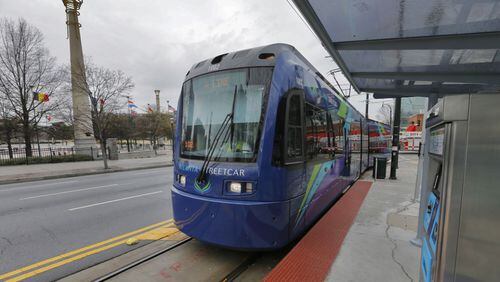More than a year after state regulators threatened to shut down the Atlanta Streetcar, city officials have finally addressed dozens of safety concerns and other problems.
Documents obtained by The Atlanta Journal-Constitution show Atlanta has fixed 50 of the 66 problems outlined in state and federal audits. And the Georgia Department of Transportation says the city is on track to tackle the rest of them this month.
What’s more, ridership on the streetcar is up nearly 10 percent in the first five months of this year after plummeting when a $1 ride charge was instituted in 2016.
It’s a double dose of good news for a streetcar that has struggled to meet expectations since it began operating two and a half years ago. Supporters hope closing a troubled chapter in the streetcar’s history will pave the way for an expansion that would allow the streetcar to play a greater role in the city’s transportation future.
“Now that we have it, we can expand it,” said Lee Biola, president of the advocacy group Citizens for Progressive Transit. “That’s what needs to happen next.”
But critics say the streetcar is still a boondoggle and should be abandoned as a failed experiment.
“It’s still a huge leap of faith to expect that, just because they’re doing better now, that this will be a success,” said Benita Dodd, vice president of the fiscally conservative Georgia Public Policy Foundation.
Strong opinions about the Atlanta Streetcar have been plentiful since it started up in December 2014.
The $99 million streetcar runs on a 2.7-mile loop that connects Centennial Olympic Park, the King Center, Georgia State University and the Peachtree Center MARTA rail station.
City officials and other boosters said it would attract business investment and tourists to downtown Atlanta and be a model for other cities across the country. But those projections have come under scrutiny.
Though supporters boast the streetcar helped spark hundreds of millions of dollars in development, an AJC analysis found some of the major projects cited – including the Georgia Aquarium's $110 million dolphin exhibit and the $70 million National Center for Civil and Human Rights – were conceived before the streetcar route was set.
Ridership also has not lived up to expectations. A consultant estimated passengers would take 1.1 million trips in the streetcar's first year if they didn't have to pay. Instead, they took just 880,083 trips in 2015, and the number of trips fell to 371,041 last year after the city began charging for rides.
But safety, maintenance and other problems uncovered by state and federal audits have been the streetcar’s biggest headache. Among other things, the audits found that half of safety-sensitive jobs were vacant; streetcar operators weren’t tested for drugs and alcohol after accidents; and problems with the streetcar’s overhead electrical system disrupted service.
Auditors ultimately identified 66 problems the city needed to correct. And when they were not addressed to regulators' satisfaction, the Georgia Department of Transportation threatened to shut down the streetcar in May 2016.
Atlanta later submitted thousands of pages of documents to address GDOT's concerns, and the agency backed off the threat. But progress was slow. Just a few months ago, Atlanta had completely resolved just 20 of the audit concerns. But the latest audit report card – obtained by the AJC – shows Atlanta has completed all but 16 of the items. And the rest should be cleared soon.
“We anticipate closure of all (audit requirements) by the end of June, barring any unforeseen events,” said GDOT spokeswoman Natalie Dale.
Atlanta Public Works Commissioner William Johnson said it could take until mid-July to complete the tasks. But either way, the city appears close to putting the audits behind it.
Ridership has rebounded in the first five months of this year, with passengers taking 178,277 trips. That’s up 9.6 percent from the same period last year, though down 39 percent from the first five months of 2015, when rides were free.
Johnson attributed the passenger increase to better on-time performance, a new mobile ticketing app and improved marketing for the streetcar. He also noted the streetcar – which travels city streets packed with automobiles – has gone nearly six months without an accident.
“A year ago, when I first arrived here, we were on the cusp of having to shut the streetcar down,” he said. “Those days are all a bad memory for us. We’re really focused now on moving forward and building on those successes.”
Atlanta plans to develop a 53-mile streetcar and light rail network. Johnson said connecting to the Beltline is the next logical expansion opportunity, though it likely will take years.
Dodd, the streetcar opponent, said that would be a mistake. She believes the streetcar is a failure, and recent improvements haven’t changed her opinion.
“It’s good news that they are resolving the problems they have,” she said. “But you don’t give a transit authority a pat on the back for fixing thing that should never have been wrong in the first place.”
Catherine Ross, a transportation systems planning expert at Georgia Tech, said the streetcar is the beginning of a good idea, even though it’s had a rough start. She expects the city to adjust its service and pricing over time as it learns from its mistakes.
Ultimately, Ross sees the streetcar as part of a larger city transportation network featuring a variety of road and transit options.
“I think there’s great potential,” she said of the streetcar. “Do I think we’ve arrived? Probably not. Are we moving in a good direction? Probably so.”
MYAJC.COM: REAL JOURNALISM. REAL LOCAL IMPACT.
The AJC's David Wickert keeps you updated on the latest in what's happening with transportation in metro Atlanta and Georgia. You'll find more on myAJC.com, including these stories:
Never miss a minute of what's happening in Atlanta transportation news. Subscribe to myAJC.com.
About the Author







